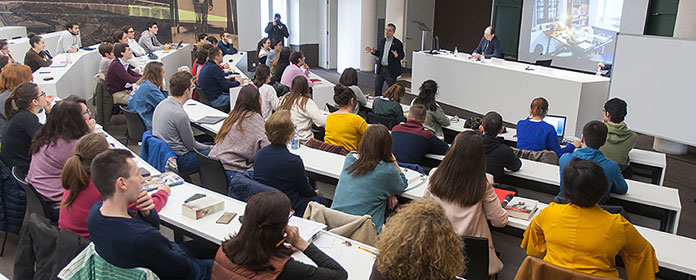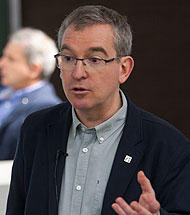2019_02_15_FYL_news_conference_santiago_posteguillo
Santiago Posteguillo: "I am considering writing a second part of Yo, Julia, because there is still much to tell about her".
The last award Planeta explains at the University the reasons that led him to tell this story: "I needed to put a central female character in my novels".


"I've started researching historical characters that interest me, but I have to decide whether to write about them or start a sequel to I, Julia. There is still a lot to tell about her". This is what Santiago Posteguillo, award Planeta 2018, has assured today in a session organized by the School of Philosophy and Letters of the University of Navarra.
In front of about a hundred attendees, most of them students of Degree in Literature and Creative Writing, and Diploma in Archaeology, the writer shared the reasons that led him to tell the story of Julia Domna, wife of Emperor Septimius Severus, which has become a bestseller.
"I was told that my female characters were not sufficiently developed and that made me quite uncomfortable, because they were right: I evaluated my sources and realized that they were all men. We men have told the story of men and I needed to put a central female character in my novels," she explained.
In this sense, she stated that "there are beginning to be women in relevant positions and it is good to know that this is not built on a historical vacuum, but that there were women who actively intervened in history, such as Julia".
Author of numerous historical novels, he assures that some documents consulted define the most powerful empress of Ancient Rome as "foreign, intriguing and promiscuous". However, he has pointed out that "the classical sources indicate that everything was slander, which led me to build the character the way I did".
The fascination of the classical worldIn this line, he explained that "documentation in the historical novel is especially important: we must take time to consider primary sources -writers who saw and lived at the time-; modern sources -contemporary writers or researchers who provide us with more information about the period-; and experimental sources -museums, archaeological sites or historical reenactment festivals-".
Asked about the interest that the classical world arouses, Posteguillo has assured that "it exerts fascination on us because we are Rome, which is very important to understand where we come from; and because it is spectacular in itself, and this is very novelistic. I think the combination makes that period very attractive for today's readers.".

